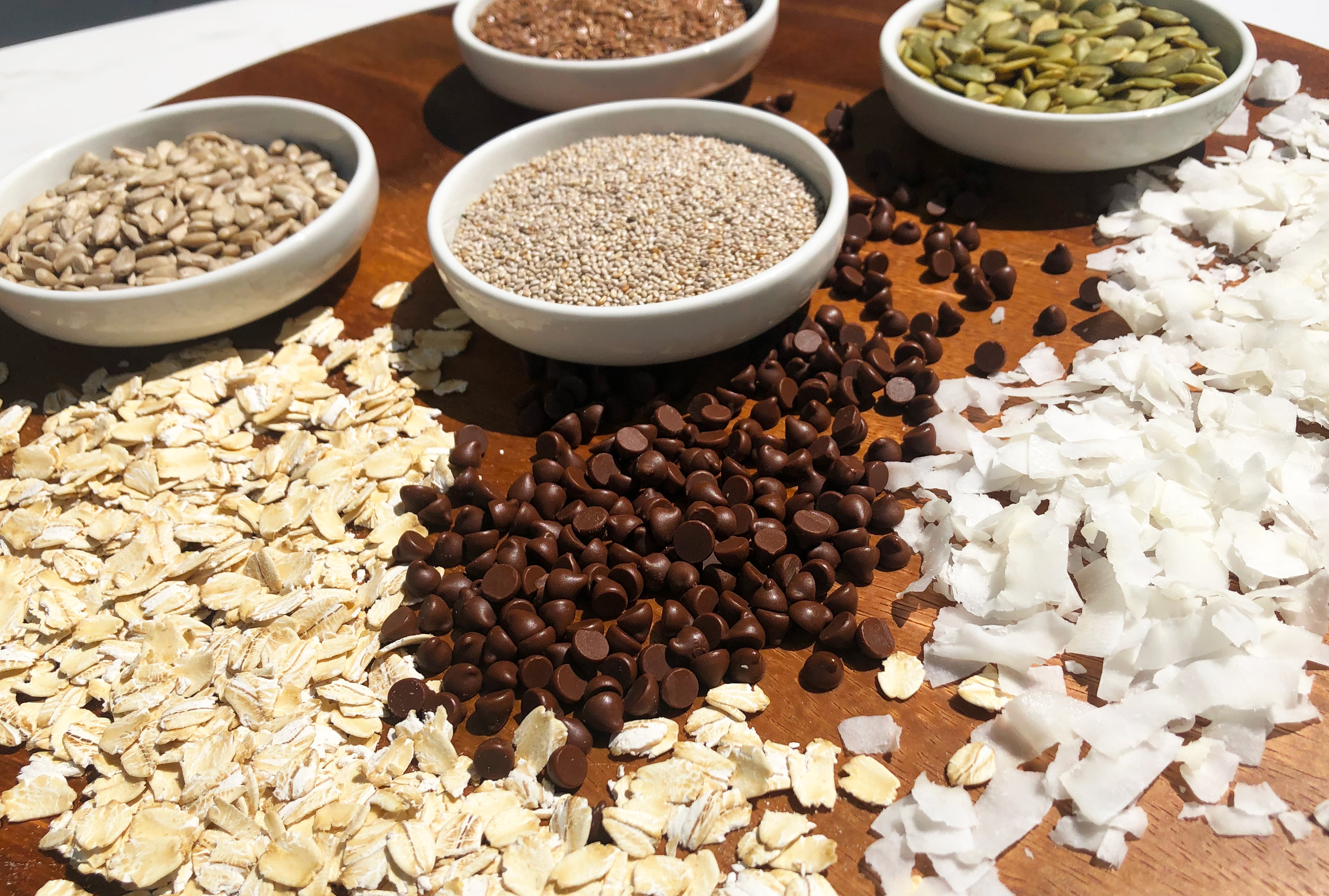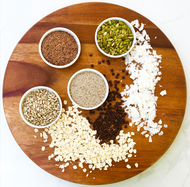Just Good Ingredients, we did not skimp on the good stuff.
Aug 7th 2020

Seeds contain all the starting materials necessary to develop into complex plants. Because of this, they are extremely nutritious.
Seeds are great sources of fiber. They also contain healthy monounsaturated fats, polyunsaturated fats, and many essential vitamins, minerals, and antioxidants.
When consumed as part of a healthy diet, seeds can help reduce blood sugar, cholesterol, and blood pressure.
Below are some of the nutritional content and health benefits of some of the healthiest seeds you can eat.
Flaxseeds, also known as linseeds, are a great source of fiber and omega-3 fats, particularly alpha-linolenic acid (ALA).
A 1-ounce (28-gram) serving of flaxseeds contains a wide mix of nutrients (3):
- Calories: 152
- Fiber: 7.8 grams
- Protein: 5.2 grams
- Monounsaturated fat: 2.1 grams
- Omega-3 fats: 6.5 grams
- Omega-6 fats: 1.7 grams
- Manganese: 35% of the RDI
- Thiamine (vitamin B1): 31% of the RDI
- Magnesium: 28% of the RD
Flaxseeds are an excellent source of fiber, omega-3 fats, lignans, and other nutrients.
Chia seeds are very similar to flaxseeds because they are also good sources of fiber and omega-3 fats and several other nutrients.
A 1-ounce (28-gram) serving of chia seeds contains (15):
- Calories: 137
- Fiber: 10.6 grams
- Protein: 4.4 grams
- Monounsaturated fat: 0.6 grams
- Omega-3 fats: 4.9 grams
- Omega-6 fats: 1.6 grams
- Thiamine (vitamin B1): 15% of the RDI
- Magnesium: 30% of the RDI
- Manganese: 30% of the RDI
Like flaxseeds, chia seeds also contain several important antioxidant polyphenols. They are a good source of omega-3 fats.
Pumpkin seeds are among the most commonly consumed types of seeds and are good sources of phosphorus, monounsaturated fats, and omega-6 fats.
A 1-ounce (28-gram) serving of pumpkin seeds contains (37):
- Calories: 151
- Fiber: 1.7 grams
- Protein: 7 grams
- Monounsaturated fat: 4 grams
- Omega-6 fats: 6 grams
- Manganese: 42% of the RDI
- Magnesium: 37% of the RDI
- Phosphorus: 33% of the RDI
Pumpkin seeds are also good sources of phytosterols, which are plant compounds that may help lower blood cholesterol. Pumpkin seeds and pumpkin seed oil are good sources of monounsaturated and omega-6 fats, and may help improve heart health.
Sunflower seeds contain a good amount of protein, monounsaturated fats and vitamin E. One ounce (28 grams) of sunflower seeds contains (44):
- Calories: 164
- Fiber: 2.4 grams
- Protein: 5.8 grams
- Monounsaturated fat: 5.2 grams
- Omega-6 fats: 6.4 grams
- Vitamin E: 47% of the RDI
- Manganese: 27% of the RDI
- Magnesium: 23% of the RDI
Sunflower seeds contain high levels of both monounsaturated and omega-6 fats, and may help reduce inflammation and cholesterol levels. Seeds are excellent sources of healthy fats, vegetarian protein, fiber, and antioxidant polyphenols. Seeds are easy to add to salads, yogurt, oatmeal, desserts, and smoothies, and can be an easy way to add healthy nutrients to your diet.
Oats are among the healthiest grains on earth. They're a gluten-free whole grain and a great source of essential vitamins, minerals, fiber, and antioxidants. Studies show that oats and oatmeal have many health benefits. These include weight loss, lower blood sugar level s, and a reduced risk of heart disease. Oats are loaded with essential vitamins, minerals, and antioxidant plant compounds. Half a cup (78 grams) of dry oats contains (5):
- Manganese: 191% of the RDI
- Phosphorus: 41% of the RDI
- Magnesium: 34% of the RDI
- Copper: 24% of the RDI
- Iron: 20% of the RDI
- Zinc: 20% of the RDI
- Folate: 11% of the RDI
- Vitamin B1 (thiamin): 39% of the RDI
- Vitamin B5 (pantothenic acid): 10% of the RDI
- Smaller amounts of calcium, potassium, vitamin B6 (pyridoxine) and vitamin B3 (niacin)
Oats are among the most nutrient-dense foods you can eat. Oats are rich in carbs and fiber but also higher in protein and fat than most other grains. They are very high in many vitamins and minerals.
Coconut is full of nutrients, but what are the benefits? A few possible benefit of eating coconut:
Full of Vitamins and Minerals:
Coconut milk has loads of vitamin B, vitamin C, and vitamin E, making it a healthy food. The vitamin E and vitamin C are beneficial to the immune system, and the B vitamins are good for cellular energy and keep your immune system going strong.
Acts as Antioxidants:
Coconut is also loaded with antioxidants. Coconut can be eaten along with other foods high in antioxidants, such as cranberries and raisins. Have your try our Cranberry Granola? It has plenty of coconut and cranberries.
Easy to Digest, High in Fiber:
As one of the benefits of eating coconut, especially if you have a Sensitive Digestive System, like Judine, coconut is much easier to digest due to the high fiber content. Being a great source of fiber, coconut keeps your bowels moving and gives your energy. The meat from coconut has more fiber in it than wheat bran and other types of grain. Coconut meat has about ten grams of fiber in a half-cup serving.
Chocolate seems to make every treat just that much better. Want some good news? We are here to banish the guilt associated with our trusted cocoa friend. While moderation is key, chocolate is packed with secret health benefits that our bodies appreciate! To name a few:
Healthier Heart:
Some compounds found in dark chocolate seem to be highly protective against the oxidation of LDL (LDL = bad cholesterol. When it oxidizes, it becomes capable of damaging other tissues). Over time, this would prevent the lodging of cholesterol in arteries, thereby reducing heart disease risk.
Excellent Source of Antioxidants:
Why do we need antioxidants? Antioxidants protect cells in your body from free radicals. Free radicals are associated with disease, radiation, and pollution in your body. Load up on antioxidants to keep your immune system healthy and prevent potential disease.
Reduce Stress:
Stress and its sneaky sidekick cortisol can wreak havoc on your body. Research shows eating chocolate reduces our stress hormone levels significantly. Our Chocolate Granola has LOTS of chocolate, just check out the ingredient list, chocolate is first on the list…we did not skimp on the chocolate.
We hope you enjoy our delicious granolas.
*These statements have not been evaluated by the Food and Drug Administration. Our products are not intended to diagnose, treat, cure, or prevent any disease.

